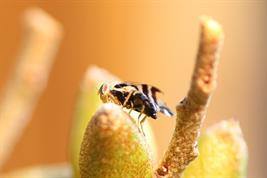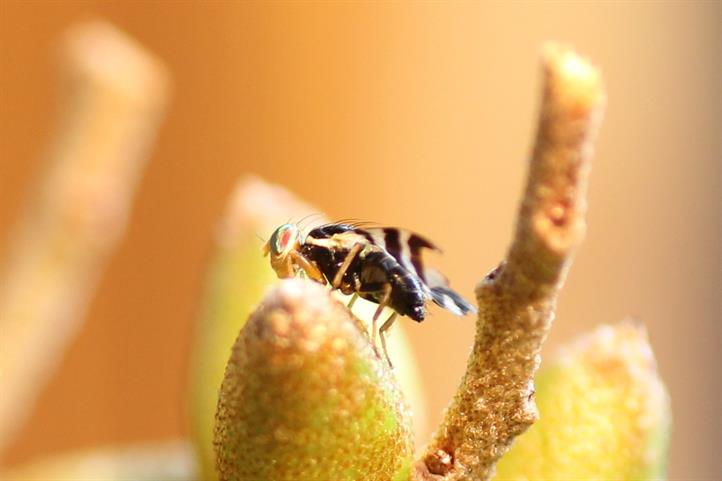18.08.2018
Press Release

With the granting of funding approval in August 2018 by the Brandenburg Secretary of State for Ministry of Rural Development, Environment and Agriculture of the Federal State of Brandenburg, Dr. Carolin Schilde, the MoPlaSa project can begin. The Leibniz Centre for Agricultural Landscape Research (ZALF) is working together with other partners on a non-chemical plant protection strategy to combat the seabuckthorn fruit fly. The project will be funded within the framework of the European Innovation Partnership (EIP) with a total of 1.17 million euros.
The cultivation of seabuckthorn occupies an area of 370 hectares in the state of Brandenburg. After apples and sweet cherries, this is the fruit with the third largest cultivation area. For several years now, however, the seabuckthorn fruit fly (Rhagoletis batava) has been causing massive losses to yields in some orchards. This affects both integrated and organically farmed seabuckthorn plantations. Chemical control methods, however, are out of the question for the latter.
ZALF, together with a consortium of growers, authorities, research institutions and companies, will investigate various control modules over the next four years and combine them into an overall strategy based on the modular principle. The spectrum of measures ranges from traps, mechanical tillage, barriers, macro- and microorganisms to the use of mobile poultry keeping and the consideration of varieties susceptibility.
In the MoPlaSa project, a plant protection strategy is to be developed that will provide all seabuckthorn growers with modulare principles for control. Both the production conditions (ecological, integrated) and the method of cultivation (extensive, intensive) will be taken into account. A handbook and short videos will summarize the recommendations in a practice-oriented way.
Funding notice:
The EIP projects are implemented in networks by practitioners, scientists, consultants, companies as well as associations and societies. The program is funded by the European Commission through the EAFRD Agricultural Fund to support research and value creation in the agri-food sector. The state of Brandenburg has 25.6 million euros available for this purpose by 2020. To organize the projects, farmers, scientists and other stakeholders set up “operational groups”. Farmers play a key role in this: Their problems determine the research agenda. They are both participants in the process of finding solutions and the first users of the expected results.
Operationelle Partner:
- agrathaer GmbH
- e-nema GmbH
- Forst Schneebecke
- Gut Schmerwitz GmbH & Co.KG
- Havelfrucht Werder GmbH
- Humboldt-University of Berlin
- Internationale Geotextil GmbH (IGG)
Associated Partners:
- Biohof Glindow GbR
- Brandenburg Plant Protection Service
- Mecklenburg-Western Pomerania State Research Institute
- German Society for Seabuckthorn and Wild Fruits - Sanddorn e.V
 Press Release as PDF
Press Release as PDF
Information:
Pictures
For downloading the pictures please click on a picture and use the icon.


Seabuckthorn fruit fly (Rhagoletis batava)| Source: © Sandra Lerche | Image source in color and print quality: http://www.zalf.de/de/aktuelles
